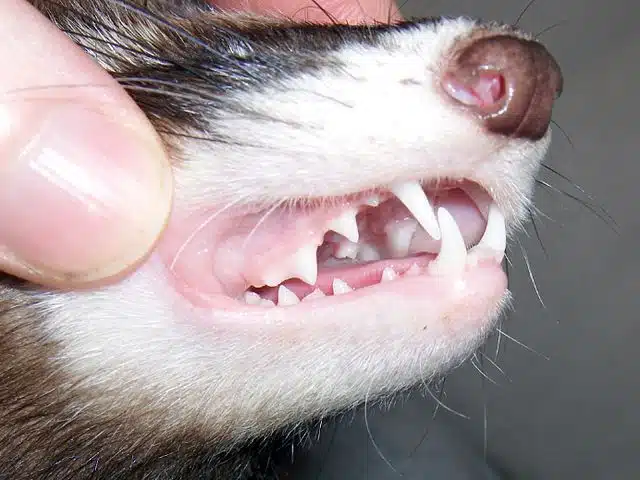Being a ferret owner, you want the best for your pet.
Ferrets are prone to a host of illnesses and diseases, so if you hear what you think is wheezing, it’s no surprise you are concerned.
Wheezing in ferrets is a high-pitched noise, which can be compared to a whistle. This is caused when the airways narrow.
It is not common and therefore it is often a symptom of an underlying cause, which you need to identify and rectify.
Hairballs
Ferrets are prone to hairballs, the same as a cat, except that a ferret requires immediate veterinarian treatment. Untreated hairballs can cause your pet’s condition to get worse.
Ferrets groom themselves with their tongues, but this causes hairballs to develop.
While hairballs may seem harmless enough, they can be very serious.
It’s possible for the hairball to get lodged in your pet’s stomach or intestines, which in turn will make it hard for your pet to eat or poop.
You may have seen your ferret wheezing and vomiting, maybe have a lack of appetite with weight loss, these are all signs of hairballs that need urgent veterinary care.
The symptoms your ferret may develop with hairballs will vary from one ferret to the other. Some may ingest hairballs and not get sick, while others may start having symptoms right away.
The most common symptoms include:
- Wheezing
- Vomiting
- Lack of appetite
- Poop with hair in it
Hairballs can occur at any time, but ferrets tend to groom themselves more when they are shedding, when there is lots of hair coming out, which can cause a hairball and in turn, cause wheezing in your pet ferret.
Respiratory Infection
Respiratory infections are relatively common in ferrets, it is when an infection occurs in the upper respiratory tract.
The most common symptoms include nasal discharge, open mouth breathing, and sneezing.

Ferrets with a lower respiratory tract infection have crackles, coughing, wheezing, and labored breathing.
Unfortunately, ferrets are prone to respiratory infections, which can be localized in the upper or lower respiratory tract.
When an infection occurs in the upper respiratory tract, it impacts the nasal passages, larynx, nose, sinus, and trachea, where the lower respiratory infection is focused on the lungs and bronchi.
You can usually pinpoint the symptoms of respiratory infection in your pet ferret, as they are so similar to the symptoms you experience when you have a cold.
Symptoms of a respiratory infection include:
- Coughing
- Nasal discharge
- Sneezing
- Discharge from the ears
- Wheezing
- Crackles when breathing
- Open-mouth breathing
Coughing Fits
Some ferrets are affected by fits of coughing, which shows that they are having some problems breathing.
Coughing is usually a way to clear the lungs of an obstruction or fluid. This can also make it hard to breathe in, which can result in a very noticeable wheezing sound, as your ferret struggles to take a breath.
Pet ferrets prone to coughing fits tend to reduce their activity levels, moving only when they really have to.

Most of the time, a bit of coughing is nothing to worry about, it may just be a way for your pet to remove some dust or hair that has tickled or caught in their throat, as they explore around the home.
Others may have a viral infection and coughing is a way to remove the germs in the body.
The body produces more mucus to traps the germs, which can irritate your pet, causing a bout of coughing, often expelling it from the body.
Then there are the more serious causes of coughing fits, which is to clear the lungs of fluid.
Fluid buildup in the lungs that cause coughing and your pet to wheeze when it tries to inhale can indicate pneumonia or even heart disease.
If you are unsure of what is causing the coughing, which in turn is causing wheezing, then visit your vet for assessment and treatment.
Asthma and Allergies
Most animals, including your ferret, can have asthma or allergies.
You may notice your pet is healthy and happy, but it tends to wheeze and cough as it goes about its business, this could be caused by allergy or asthma.
Asthma and allergies can be triggered by pollens, strong fragrances, and dust.
Schedule an appointment with the vet to ensure your pet doesn’t have a respiratory infection.
If your ferret is struggling for air and wheezing, its gums and tongue start turning blue, or it starts losing consciousness, consider it a medical emergency and get to your vet right away.
Summary
Ferrets are not considered an easy animal to keep and they can be prone to numerous illnesses and allergies.
Wheezing is not that common and often associated with hairballs or respiratory infections, though it can be caused by coughing fits and asthma.
Always visit your vet when your ferret has been wheezing for more than a day to eliminate respiratory infection and help your pet get back on the road to recovery.
Further Reading: